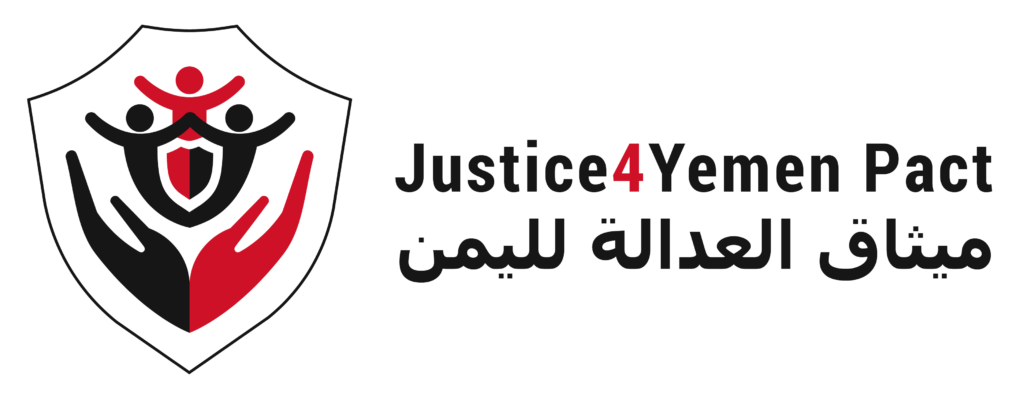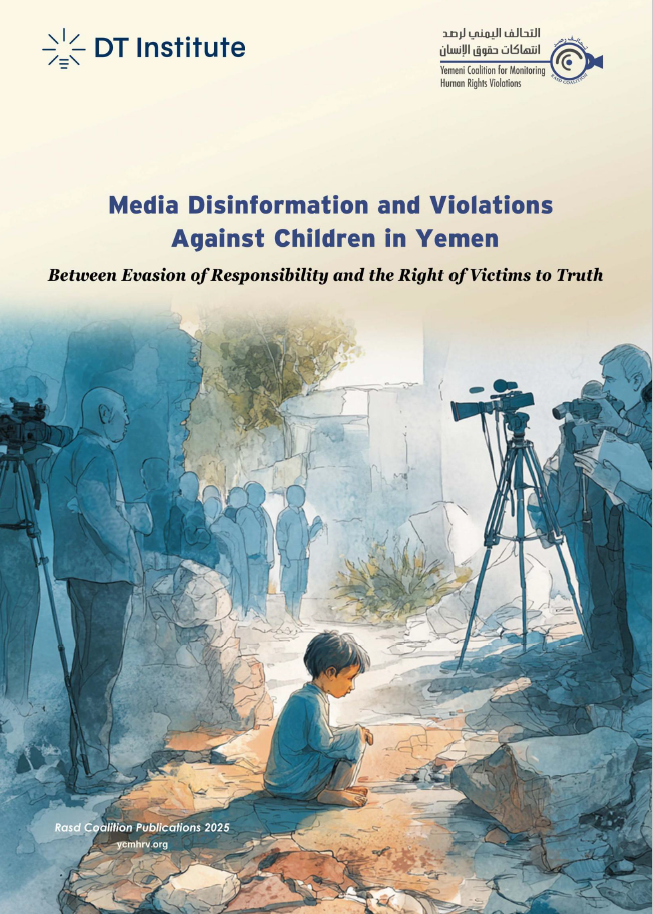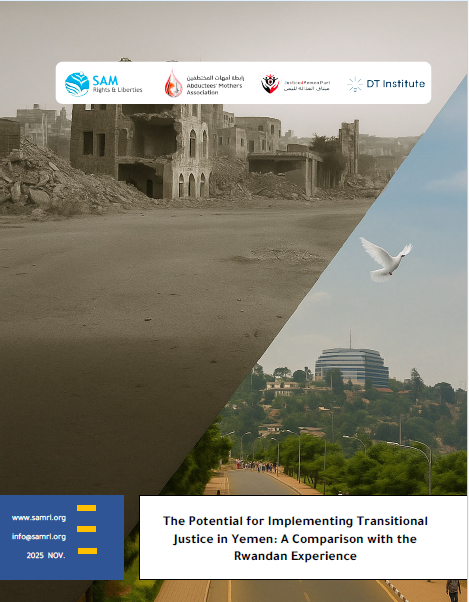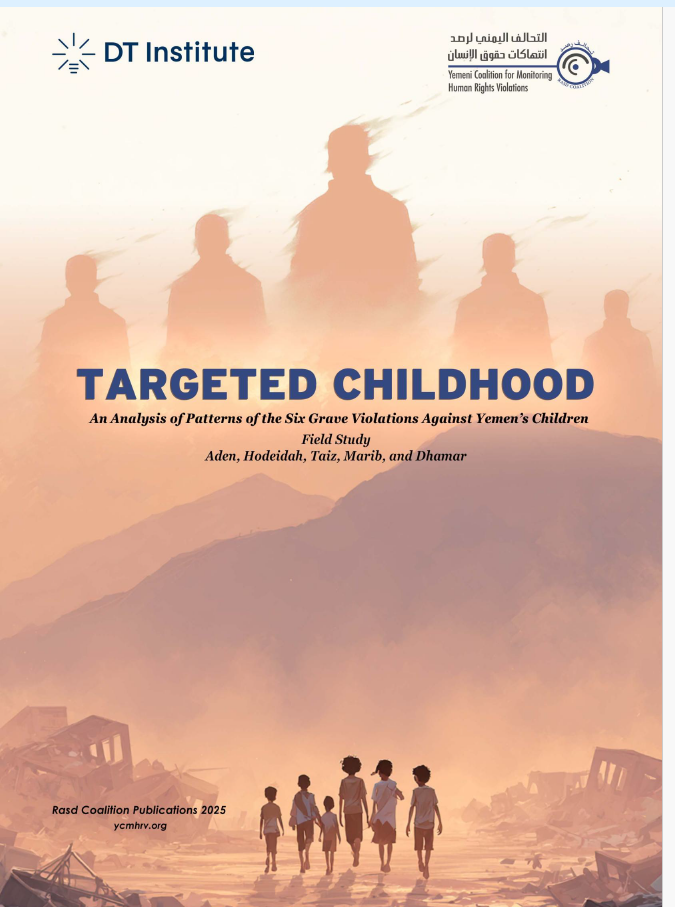
“In moments of collapse that follow wars, it is not enough to rebuild stones; consciousness must also be reshaped. A society emerging from conflict needs a moral and intellectual framework to help it overcome the wounds of the past and forge a new horizon based on reconciliation and justice.”
— Tawfiq al-Humaidi, Head of SAM for Human Rights and Liberties (SAM), in an article published by Barran Press.
For decades, perpetrators of violence in Yemen have acted with impunity, while victims have felt betrayed by peace processes that equated “justice” with pardons for war criminals. At the same time, extremist campaigns framed transitional justice as a foreign, unethical, and non-religious concept. Recognizing this critical gap, SAM for Human Rights and Liberties (SAM), in partnership with the Abductees’ Mothers Association, with the support of the DT Institute, and in cooperation with the Endowment Office in Taiz, launched a pioneering initiative under the SPARK project. The initiative sought to influence Islamic preachers and religious guides to become advocates for accountability. Through tailored training, 20 preachers (17 men and 3 women) connected transitional justice principles with core Islamic values, opening a new path for justice deeply rooted in Yemen’s culture and faith.
Diving Through an Array of Unknowns
The initiative launched into a complex and hostile environment. It had to combat aggressive campaigns of disinformation and extremism, which not only claimed transitional justice was “Western” but also spread the damaging narrative that civil society organizations were foreign agents. This propaganda had been entrenched over years of war by proxy forces.
In addition, many preachers resisted the training because they initially believed it was about pardoning war parties like the Houthis. This profound misconception can be attributed to the long-standing practice of reconciliation in Yemen where impunity is always granted for human rights violations, and the absence of transitional justice as a priority.
In a context of dire economic hardship, many also dismissed justice as a “luxury call” that distracted from immediate survival needs. Another major challenge was the fear of being targeted, as trained preachers worried about a backlash from extremist peers.
SAM also observed the alarming rise of more than 30 mosques operating outside the moderate public religious scope of Taiz. These mosques functioned as parallel educational structures, substituting formal schools with a curriculum based exclusively on uloom shari’ah (Islamic religious sciences). This not only prevented children from receiving a well-rounded education but also isolated them from a message of peace. Worse, these mosques were influenced by external funding and agendas, leaving them vulnerable to radicalization and potential escalation of conflict.
Was not easy, but worth it!
Despite these challenges, the project succeeded in a positive engagement with the faith sector by approaching preachers through leveraging established networks and adopting a conflict-sensitive approach. As SAM’s coordinator, Muath Al-Fakih, shared, “It was not easy, there was a lot of resistance, but through our networking and lobbying and many dialogues, we managed to convince those preachers to join the training.” The project proved that a faith-based approach is not only viable but a powerful force for change.
The initiative’s success began with a profound transformation of perceptions. The training led to visible shifts in mindset, turning skepticism into advocacy. One marginalized preacher,from Birdad Sabr Almawdim a rural district in Taiz, who initially opposed transitional justice, became a vocal advocate after the program. He said, “It is the first time in my life to hear the word ‘transitional justice’ and to attend a session with civil society. I did not expect this level of learning. This training changed my perception and allowed me to think differently — not of justice as letting go, but as accountability.” This shift was so significant that the preacher prepared an outstanding sermon on the topic and even offered to deliver it in other mosques and areas.
This new mindset led to community ownership, as preachers took the initiative by designing their own sermon plans for mosques and schools. The training also fostered a sense of harmony among the religious guides, who moved past their ideological differences. They collectively agreed on a Code of Honor and issued a joint statement—a major advocacy milestone. This momentum reached a system-level change when a manual on transitional justice was developed with religious experts and the Endowment Office staff. The preachers provided valuable feedback and requested its publication, demonstrating their commitment and local ownership. The project’s message continued to expand its outreach with up to 20 sermons delivered across Taiz and three radio episodes reaching thousands of listeners.
The initiative led to a key institutional breakthrough: the Endowment Office agreed to integrate transitional justice into its official sermon plans and formally requested additional legal training from SAM to strengthen their understanding of the legal accountability of religious speeches.
“We are always open to all activists who contribute positively to Taiz and who bring goodness to the community.” – Abu Bakr Hashim, General Head of the Endowment Office in Taiz
Crucially, this initiative also addressed the gender dimension by including moderate female preachers. This was a strategic step to counteract the influence of extremist women who play a significant role in spreading hate and indoctrination since they have easier access to households, and particularly among young girls. The inclusion of these female voices ensures that women’s perspectives are represented in a religious discourse that has often been exploited during the war to reduce women to mere followers of radical messages. As one female participant explained, “This training helped me understand the complexity of our society and how I, as a preacher, can contribute positively to rebuilding it.” Her experience highlights how a faith-based approach can not only address justice but also empower women to become active agents of peace and reconciliation.

Seizing a missed opportunity:
The experience of this initiative provides crucial insights for future peacebuilding efforts, proving that success requires respecting local realities and building trust gradually. For many preachers, this meant anonymity was essential for their safety, a reality that shaped the project’s approach. The project also proved that incremental change matters, as small, step-by-step interventions can accomplish what more direct, top-down approaches cannot, and crucially, the inclusion of moderate female preachers is a vital strategic measure to counter extremism and support justice.
The initiative also revealed that the disengagement of faith actors in Yemen was never rooted in a fundamental opposition to justice. Rather, it was the result of widespread misconceptions. Once these were clarified, skepticism quickly turned into advocacy, revealing that the absence of faith actors in earlier peace initiatives represented a missed opportunity—one this project has now begun to reclaim.
“By dismantling disinformation and enabling understanding of transitional justice principles, this initiative has revealed a natural and symbiotic relationship between faith-based institutions and transitional justice initiatives that must be nurtured,” said Lynn Arbid, programme officer with DT Institute.
The project has targeted five districts out of eight from rural districts. A key lesson learned is the profound influence of local preachers, especially in rural areas where access to education is limited and mosques serve as the most trusted institutions. According to global data, nearly 60% of Yemen’s population lives in rural areas. This makes local preachers indispensable for shaping public awareness and demonstrates that faith-based legitimacy is vital. As Sahar Mohammed, Programme Assistant at DT Institute, explained, “Religious speech is rooted in local culture, unlike external discourse that often fails to resonate.” As one preacher also noted, “Preachers have a major role in advancing transitional justice, especially at this stage, because Yemeni society is deeply influenced by religion. The majority listens to their voices.”
New-found faith:
This initiative demonstrates the transformative potential of engaging faith-based actors in transitional justice, and a path is now clear to build on this momentum. SAM and DT Institute are looking to scale this approach beyond Taiz to other governorates, carefully adapting the model to local norms and tribal practices.
To ensure sustainability, SAM plans to formalize a forum for preachers, creating a permanent network of religious leaders who can coordinate their voices and strengthen positive messaging. This new network will serve as a foundational pillar for future reconciliation and justice efforts. To inform this growth, a field study is also planned to investigate the independent mosques operating outside of official oversight, with the goal of designing targeted interventions to address radical indoctrination and protect vulnerable communities. As participants and Endowment officials have emphasized, this model can and should be replicated across Yemen, aligning with Islamic teachings on peace, dignity, and security to give them strong local legitimacy. As Feras Hamdouni, Project Manager of Yemen Projects at DT Institute concluded:
“This initiative shows how strategic engagement with trusted community leaders can lay the foundations for sustainable reconciliation and justice in Yemen.”
With a new-found “faith in justice,” these preachers have created a powerful momentum that must be seized and built upon for the future of Yemen. Abdul-Wadud, Deputy Director of the Endowment Office confirmed: “The most important role now lies with scholars, preachers, and guides to spread peace, love, reconciliation, and unity across all segments of society.”





